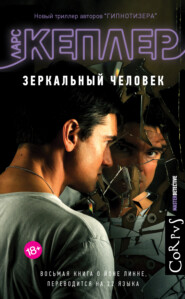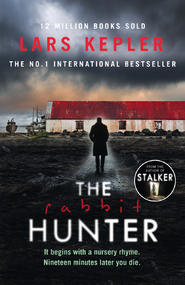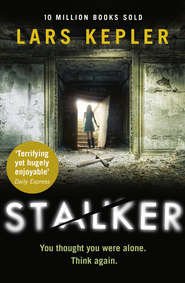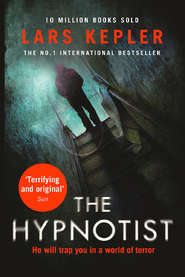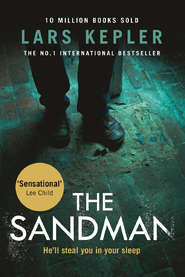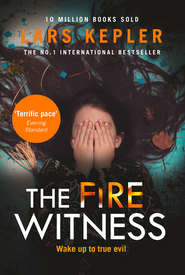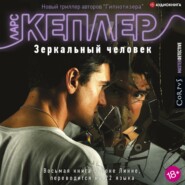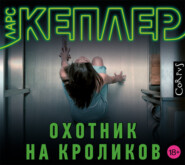По всем вопросам обращайтесь на: info@litportal.ru
(©) 2003-2024.
✖
The Nightmare
Настройки чтения
Размер шрифта
Высота строк
Поля
‘Aim for the jetty!’
She turns and puts the engines in reverse, then switches them off when the fore hits the jetty with a creak. The whole side of the boat scrapes past some protruding wooden steps. The swell hisses as it hits the rocks and rolls back towards them. The boat rocks sideways and the wooden steps shatter as water washes over the railings. They leap off the boat and hurry across the jetty. Behind them they hear the hull scrape against the jetty on the waves. They race towards land as the black inflatable roars towards them. Penelope slips and puts her hand out, then clambers up the steep rocks towards the trees, gasping for breath. The inflatable’s engines go quiet below them, and Penelope realises that they have barely any advantage at all. She and Björn rush through the trees, deeper into the forest, while her mind starts to panic as she looks around for somewhere they can hide.
4 (#ulink_1afbc208-768f-54e9-b2a0-13e65f8b7cc4)
The floating man (#ulink_1afbc208-768f-54e9-b2a0-13e65f8b7cc4)
Paragraph 21 of Swedish Police Law permits a police officer to gain entry to a house, room or other location if there is reason to believe that someone may have died, is unconscious or otherwise incapable of calling for help.
The reason why Police Constable John Bengtsson on this Saturday afternoon in June has been instructed to investigate the top flat at Grevgatan 2 is that the director general of the Inspectorate for Strategic Products, Carl Palmcrona, has been absent from work without any explanation and missed a scheduled meeting with the Foreign Minister.
It’s far from the first time that John Bengtsson has had to break into someone’s home to see if anyone is dead or injured. Mostly it’s been because relatives have suspected suicide. Silent, frightened parents forced to wait in the stairwell while he goes in to check the rooms. Sometimes he finds young men with barely discernible pulses after a heroin overdose, and occasionally he has discovered a crime scene, women who have been beaten to death lying in the glow from the television in the living room.
John Bengtsson is carrying his house-breaking tools and an electric pick gun as he walks in through the imposing front entrance. He takes the lift up to the fifth floor and rings the doorbell. He waits a while, then puts his heavy bag down on the floor and inspects the lock. Suddenly he hears a shuffling sound in the stairwell, from the floor below. It sounds like someone is trying to creep silently down the stairs. Police Constable John Bengtsson listens for a while, then reaches out and tries the handle: the door isn’t locked, and glides open softly on its four hinges.
‘Is anyone home?’ he calls.
John Bengtsson waits a few seconds, then pulls his bag into the hall and closes the door, wipes his shoes on the doormat and walks further into the large entrance hall.
Gentle music can be heard in a neighbouring room. He goes over, knocks and walks in. It’s a spacious reception room, sparsely furnished with three Carl Malmsten sofas, a low glass table and a small painting of a ship in a storm on the wall. An ice-blue glow is coming from a flat, transparent music centre. Melancholic, almost tentative violin music is playing from the speakers.
John Bengtsson walks over to the double door and opens them, and finds himself looking into a sitting room with tall, art-nouveau windows. The summer light outside is refracted through the tiny panes of glass in the top sections of the windows.
A man is floating in the centre of the white room.
It looks supernatural.
John Bengtsson stands and stares at the dead man. It feels like an eternity before he spots the washing-line fixed to the lamp-hook.
The well-dressed man is perfectly still, as if he had been frozen in the middle of a big jump, with his ankles stretched and the toes of his shoes pointing down at the floor.
He’s hanging – but there’s something else, something that doesn’t make sense, something wrong.
John Bengtsson mustn’t enter the room. The scene needs to be left intact. His heart is beating fast, he can feel the heavy rhythm of his pulse, and swallows hard, but he can’t tear his eyes from the man floating in the middle of the empty room.
A name has started to echo inside John Bengtsson’s head, almost as a whisper: Joona. I need to speak to Joona Linna.
There’s no furniture in the room, just a hanged man, who in all likelihood is Carl Palmcrona, the director general of the Inspectorate for Strategic Products.
The cord has been fastened to the middle of the ceiling, from the lamp-hook in the middle of the ceiling-rose.
There was nothing for him to climb on, John Bengtsson thinks.
The height of the ceiling is at least three and a half metres.
John Bengtsson tries to calm down, gather his thoughts and register everything he can see. The hanged man’s face is pale, like damp sugar, and he can see no more than a few spots of blood in his staring eyes. The man is wearing a thin overcoat on top of his pale grey suit, and a pair of low-heeled shoes. A black briefcase and a mobile phone are lying on the parquet floor a little way from the pool of urine that has formed immediately beneath the body.
The hanged man suddenly trembles.
John Bengtsson holds his breath.
There’s a heavy thud from the ceiling, hammer-blows from the attic – someone is walking across the floor above. Another thud, and Palmcrona’s body trembles again. Then comes the sound of a drill, which stops abruptly. A man shouts something. He needs more cable, the extension lead, he calls.
John Bengtsson notices his pulse settle down as he walks back through the sitting room. In the hall the front door is standing open. He stops, certain that he closed it properly, but perhaps he was mistaken. He leaves the flat and before he reports back to the station he takes out his mobile phone and calls Joona Linna of the National Crime Unit.
5 (#ulink_aac29ebc-b393-57d2-b4cf-7d936f8aef9f)
National Homicide Commission (#ulink_aac29ebc-b393-57d2-b4cf-7d936f8aef9f)
It’s the first week of June. In Stockholm people have been waking up too early in the morning for weeks. The sun rises at half past three, and it’s light almost all night through. It’s been unusually warm for the time of year. The cherry trees were in blossom at the same time as the lilac. Heavy clusters of flowers spread their scent all the way from Kronoberg Park to the entrance to the National Police Committee.
The National Crime Unit is Sweden’s only operative police department tasked with combatting serious crime on both a national and international level.
The head of the National Crime Unit, Carlos Eliasson, is standing at his low window on the eighth floor looking out at the steep slopes of Kronoberg Park. He’s holding a phone, and dials Joona Linna’s number, but once again his call goes straight to voicemail. He ends the call, puts the phone down on his desk and looks at his watch.
Petter Näslund comes into Carlos’s office and clears his throat quietly, then stops and leans against a poster saying ‘We watch, scrutinise and irritate.’
From the next room they can hear a weary telephone conversation about European arrest warrants and the exchange of information in the Schengen Zone.
‘Pollock and his team will be here soon,’ Petter says.
‘I know how to tell the time,’ Carlos replies gently.
‘The sandwiches are ready, anyway,’ Petter says.
Carlos suppresses a smile and asks:
‘Have you heard that they’re recruiting?’
Petter’s cheeks go red and he lowers his eyes, then composes himself and looks up again.
‘I’d … Can you think of anyone who’d be better suited to the National Homicide Commission?’ he asks.
The National Homicide Commission consists of six experts who assist with murder cases throughout Sweden. The commission provides systematic support within a framework designed for serious crimes.
The workload of the permanent members of the National Homicide Commission is extreme. They’re in such high demand that they very rarely have time to meet at Police Headquarters.
When Petter Näslund has left the room Carlos sits down behind his desk and looks over at the aquarium and his paradise fish. Just as he is reaching for the tub of fish-food his phone rings.
‘Yes?’ he says.
‘They’re on their way up,’ says Magnus in reception.
‘Thanks.’
Carlos makes one last attempt to get hold of Joona Linna before getting up from his chair, glancing at himself in the mirror and leaving the room. As he emerges into the corridor the lift pings and the door slides open without a sound. At the sight of the members of the National Homicide Commission an image flits quickly through his mind, a memory from a Rolling Stones concert he went to with a couple of colleagues a few years ago. As they walked out on stage, the group reminded him of laidback businessmen. Just like the members of the National Homicide Commission, they were all wearing dark suits and ties.
First is Nathan Pollock, with his grey hair in a ponytail, followed by Erik Eriksson with his diamond-studded glasses, which is why the rest of the team call him Elton. Behind him comes Niklas Dent, alongside P. G. Bondesson, and bringing up the rear is the forensic expert Tommy Kofoed, hunch-backed and staring morosely at the floor.






